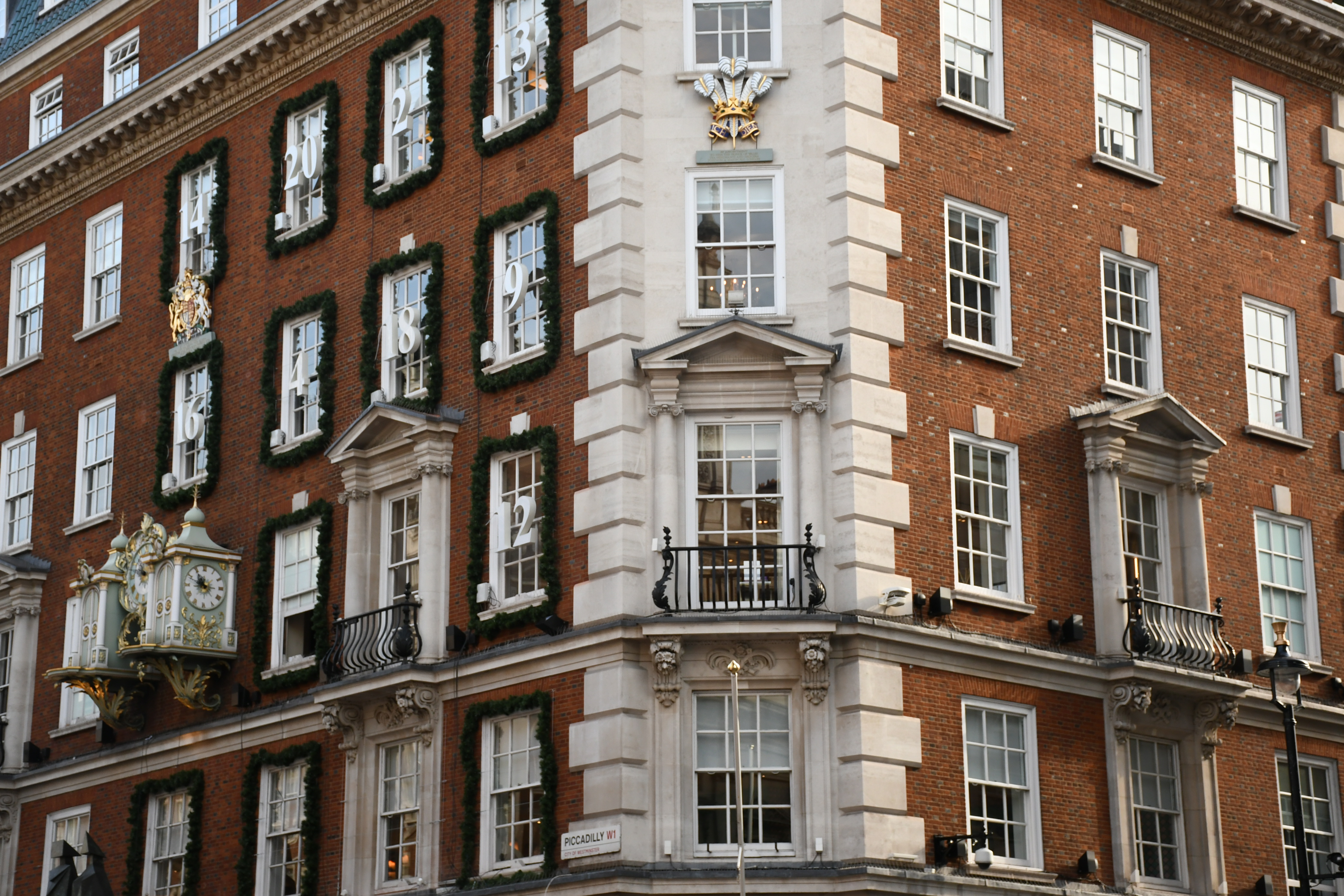"It inculcates purity and harmony, the mystery of mutual charity, the romanticism of the social order. It is essentially a worship of the Imperfect, as it is a tender attempt to accomplish something possible in this impossible thing we know as life."
Kakuzo Okakura
On a bright corner in London, between Piccadilly Circus and Green Street Stations, is my favorite London destination: two neighboring purveyors. To the left, Fortnum & Mason, a department store and tea merchant since 1703; on the right, Hatchard Bookshop, an inimitable vendor of warming poetry (and other books) since 1797.
Let’s step inside the former and browse the teas.
 Fortnum's proud front during winter holidays. I've been informed there is a large peacock astride the brick at present (made by Billie Achilleos), but I have yet to see it. Photograph by Ellen Vrana.
Fortnum's proud front during winter holidays. I've been informed there is a large peacock astride the brick at present (made by Billie Achilleos), but I have yet to see it. Photograph by Ellen Vrana.Russian Caravan: “Light and nutty.” This one is my favorite for all days that are not Monday.
Chai: “Spicy and exquisite.”
Rose Pouchong: "Floral and Elegant." Imperative to take it with milk and soupçon of sugar.
Fortmason: "Perfumed and subtle.” This is my favorite for Mondays.
Chamomile: "Soothing and Relaxing." Sigh. Chamomile bores me. It does. I keep it for guests and rabbits.

“Poetry is a balance of things opposed.”
Who said that? Coleridge? It must be, for Coleridge’s own “Kubla Khan” slaps us with contradiction.
Nothing is, indeed, the ultimate balance.
Coleridge can be a bit nutty. I recommend “Pleasures” by British poet Denise Levertov. for a softer, more internal warmth. An old favorite. I love how the right margin undulates in soothing harmony;
I like to find
what’s not found
at once, but lies
within something of another nature,
in repose, distinct.
Gull features of glass, hidden
in white pulp: the bones of squid
which I pull out and lay
blade by blade on the draining board –tapered as if for swiftness, to pierce
the heart, but fragile, substance
belying design.
Read it aloud and tap as you go. Find the syllables to stress; they are hidden, complex. They don’t keep to the breaks.
There is a delightful something hidden, something simple and stimulating.

Tea has elegance, too, in its proportion: hot liquid, cool pot.
I hold empty pots to my neck in the summer. Tea and milk (I prefer milk), steeping. And even in the production: a plucked leaf, wilted, bruised, oxidized, shaped, and dried, all in proportion. And I am left with 250g of loose Russian Caravan, smoky and salutary for all those days that are not Monday.
An old favorite. Delicious poems await. Tea and poetry.
Onward to the bookshop!
Hatchards, once you skoosh past the throngs, the stacks of best-sellers, and the queue for the till, opens to a large, beckoning interior full of lit shelves, dark wood struts, and an ambling staircase.
First, a fantastic sip of British novelist P. G. Wodehouse (Hatchard has a lovely collection, although Wodehouse is also enjoyable aloud), a stir with Romantic verse, and finally, a selection of Stephen Fry’s The Ode Less Traveled. Fry has long indulged in poetry. He studies it, writes it, and in this superlative book, explains it. Any aspiring poet should read, own, and underline it thoroughly.
“You can never read a poem too slowly," Fry cautions, urging a pause. We must exist in the atmospheric stillness, a state that artist Leonard Cohen called the most difficult and rewarding of his life.
Something stirs. A contradiction. Few cultures celebrate tea as extravagantly as the British, as novelist Graham Greene remembered in his memoirs:
The silver pot, the tall tiered cake-stand, like a Chinese temple, two kinds of bread and butter, white and brown, cucumber and tomato sandwiches cut razor-thin, scones, rock-buns, and then all the cakes…

Indeed. Yet, it is a culture that often rejects indulgence—from preferred weather-oriented conversation staples to the “Keep calm…” (and do-not-indulge-emotions) mantra. Yet, indulgence in tea and poetry. Why?
Drink tea. Read poetry. Do both indulgently?
In our modern life, there is much need for pause. Someone steps in your way, cuts in the queue, or snaps; we can respond (usually negatively) or pause. Although random pauses accomplish little, specific pauses between moments of stimulation and response accomplish everything.
We not only pause but also saturate that pause with comfort, thoughtfulness, and meaning—feelings created by tea and poetry. Will we be more likely to find empathy, patience, and kindness? A reflection on those decadent pleasures and the joy they bring…
Might we even find “purity and harmony”?
Those aren’t my words; they belong to Kakuzo Okakura, a Japanese scholar and cultural critic who wrote The Book of Tea in 1906 extolling the aestheticism of tea and the delight of the poetic-minded pause.
It inculcates purity and harmony, the mystery of mutual charity, the romanticism of the social order. It is essentially a worship of the Imperfect, as it is a tender attempt to accomplish something possible in this impossible thing we know as life.[…]
The afternoon glow is brightening the bamboos, the fountains are bubbling with delight, the soughing of the pines is heard in our kettle. Let us dream of evanescence and linger in the beautiful and foolishness of things.
Whether you hold a mug or book, you step into the still air and deep comfort brought on by the enjoyment of soul-enriching activities. Find something buried, something vulnerable, possibly your best self.


